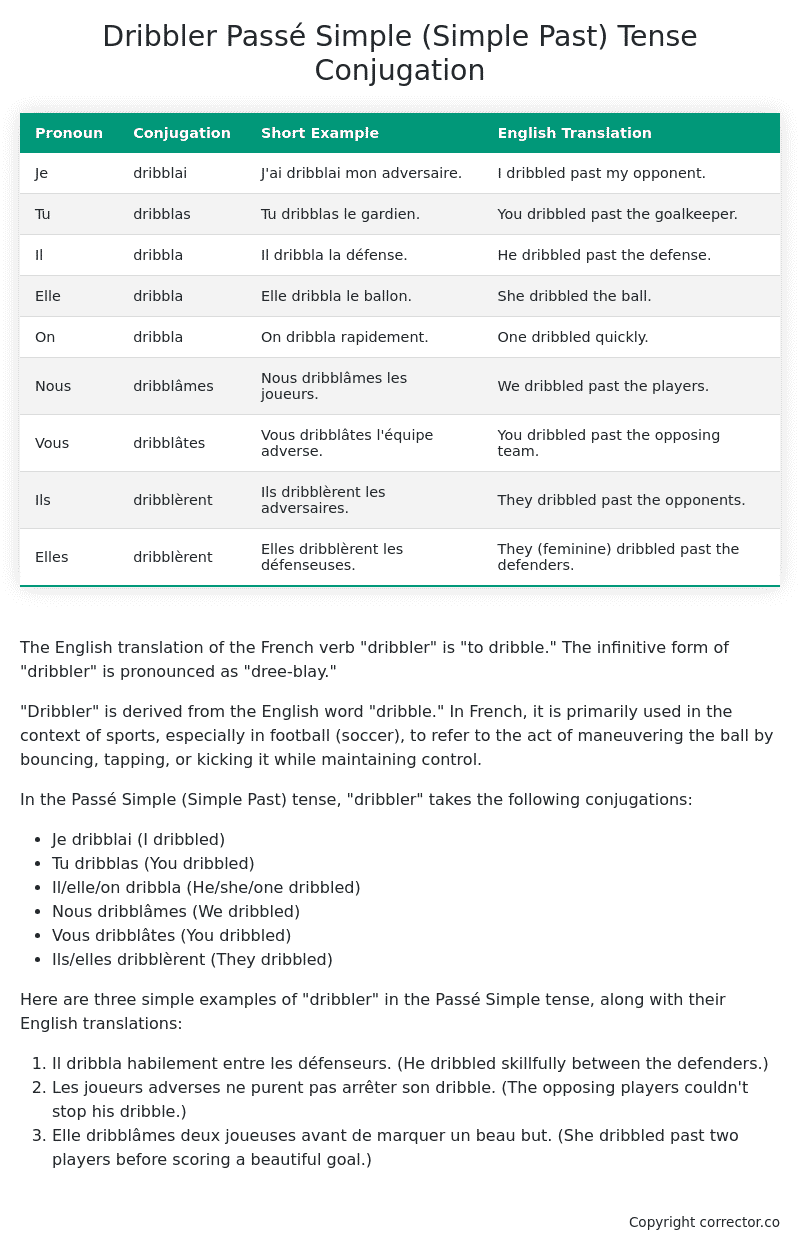Passé Simple (Simple Past) Tense Conjugation of the French Verb dribbler
Introduction to the verb dribbler
The English translation of the French verb “dribbler” is “to dribble.” The infinitive form of “dribbler” is pronounced as “dree-blay.”
“Dribbler” is derived from the English word “dribble.” In French, it is primarily used in the context of sports, especially in football (soccer), to refer to the act of maneuvering the ball by bouncing, tapping, or kicking it while maintaining control.
In the Passé Simple (Simple Past) tense, “dribbler” takes the following conjugations:
- Je dribblai (I dribbled)
- Tu dribblas (You dribbled)
- Il/elle/on dribbla (He/she/one dribbled)
- Nous dribblâmes (We dribbled)
- Vous dribblâtes (You dribbled)
- Ils/elles dribblèrent (They dribbled)
Here are three simple examples of “dribbler” in the Passé Simple tense, along with their English translations:
- Il dribbla habilement entre les défenseurs.
(He dribbled skillfully between the defenders.) - Les joueurs adverses ne purent pas arrêter son dribble.
(The opposing players couldn’t stop his dribble.) - Elle dribblâmes deux joueuses avant de marquer un beau but.
(She dribbled past two players before scoring a beautiful goal.)
Table of the Passé Simple (Simple Past) Tense Conjugation of dribbler
| Pronoun | Conjugation | Short Example | English Translation |
|---|---|---|---|
| Je | dribblai | J’ai dribblai mon adversaire. | I dribbled past my opponent. |
| Tu | dribblas | Tu dribblas le gardien. | You dribbled past the goalkeeper. |
| Il | dribbla | Il dribbla la défense. | He dribbled past the defense. |
| Elle | dribbla | Elle dribbla le ballon. | She dribbled the ball. |
| On | dribbla | On dribbla rapidement. | One dribbled quickly. |
| Nous | dribblâmes | Nous dribblâmes les joueurs. | We dribbled past the players. |
| Vous | dribblâtes | Vous dribblâtes l’équipe adverse. | You dribbled past the opposing team. |
| Ils | dribblèrent | Ils dribblèrent les adversaires. | They dribbled past the opponents. |
| Elles | dribblèrent | Elles dribblèrent les défenseuses. | They (feminine) dribbled past the defenders. |
Other Conjugations for Dribbler.
Le Present (Present Tense) Conjugation of the French Verb dribbler
Imparfait (Imperfect) Tense Conjugation of the French Verb dribbler
Passé Simple (Simple Past) Tense Conjugation of the French Verb dribbler (You’re reading it right now!)
Passé Composé (Present Perfect) Tense Conjugation of the French Verb dribbler
Futur Simple (Simple Future) Tense Conjugation of the French Verb dribbler
Futur Proche (Near Future) Tense Conjugation of the French Verb dribbler
Plus-que-parfait (Pluperfect) Tense Conjugation of the French Verb dribbler
Passé Antérieur (Past Anterior) Tense Conjugation of the French Verb dribbler
Futur Antérieur (Future Anterior) Tense Conjugation of the French Verb dribbler
Subjonctif Présent (Subjunctive Present) Tense Conjugation of the French Verb dribbler
Subjonctif Passé (Subjunctive Past) Tense Conjugation of the French Verb dribbler
Subjonctif Imparfait (Subjunctive Imperfect) Tense Conjugation of the French Verb dribbler
Subjonctif Plus-que-parfait (Subjunctive Pluperfect) Tense Conjugation of the French Verb dribbler
Conditionnel Présent (Conditional Present) Tense Conjugation of the French Verb dribbler
Conditionnel Passé (Conditional Past) Tense Conjugation of the French Verb dribbler
Conditionnel Passé II (Conditional Past II) Tense Conjugation of the French Verb dribbler
L’impératif Présent (Imperative Present) Tense Conjugation of the French Verb dribbler
L’impératif Passé (Imperative Past) Tense Conjugation of the French Verb dribbler
L’infinitif Présent (Infinitive Present) Tense Conjugation of the French Verb dribbler
L’infinitif Passé (Infinitive Past) Tense Conjugation of the French Verb dribbler
Le Participe Présent (Present Participle) Tense Conjugation of the French Verb dribbler
Le Participe Passé (Past Participle) Tense Conjugation of the French Verb dribbler
Struggling with French verbs or the language in general? Why not use our free French Grammar Checker – no registration required!
Get a FREE Download Study Sheet of this Conjugation 🔥
Simply right click the image below, click “save image” and get your free reference for the dribbler Passé Simple tense conjugation!

Dribbler – About the French Passé Simple (Simple Past) Tense
Formation
Usage
Narration
Historical Context
Interactions with other tenses
Passé Composé
Imparfait
Conditional and Subjunctive
Summary
I hope you enjoyed this article on the verb dribbler. Still in a learning mood? Check out another TOTALLY random French verb conjugation!


